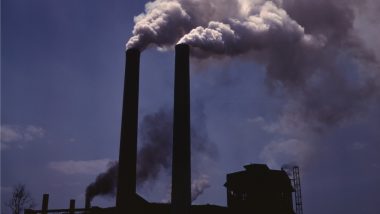As UN’s climate conference is going on in Katowice, Poland a new report should add to the urgency to create a framework that helps countries achieve climate-change mitigation goals. The new report says that 2018 saw one of the highest levels of Carbon dioxide rise in the atmosphere in recent years.
The research, carried out by the Global Carbon Project (GCP), says that this year's "strong" rise in CO2 levels is projected to be 2.7% as compared to 2017's 1.6%. The report was authored by 76 scientists from 57 research institutions in 15 countries. “After low growth during 2014 to 2016, fossil CO2 emissions have now risen two years in a row, with a 1.6 per cent rise in 2017 and a projected 2.7 per cent (range 1.8 per cent to 3.7 per cent) rise expected in 2018, reaching a record high of 37.1 (plus or minus 2) billion tonnes of CO2. The peak in global CO2 emissions is not yet in sight,” the report said.
The report cites an increase in coal usage by China, and increased consumption of fossil fuels by cars, trucks and airplanes across many countries including India as major contributors to the rise in CO2 levels. The report also said despite an increase in renewable energy sources, green energy is unable to come close to the global economy’s energy demands which means that people continue to guzzle fossil fuels.
For example, in the European Union region, the amount of fuel used for flights and road transport has surged by 4% where it had been falling in previous years. In U.S., use of coal actually fell but fossil fuels used in car journeys rose by 1.4%.
In countries like India, people are driving bigger petrol and diesel cars, travelling further than before. India is the fourth highest emitter of carbon dioxide after China, U.S., and the EU region. Due to India’s growing economy, India's emissions grew by 6.3% and is expected to touch 2.62 billion tonnes, the report says. India’s growth in emissions was in fact the maximum for any major emitter.
“The global rise in carbon emissions is worrying, because to deal with climate change they have to turn around and go to zero eventually,” said Prof Corinne Le Quéré, at the University of East Anglia,who led the research published in the journal Nature. “We are not seeing action in the way we really need to. This needs to change quickly.”
However, the report’s authors says all is not lost and that emissions trend can still be turned around by 2020, if cuts are made in transport, industry and farming emissions. Le Quéré said: “I hope that by 2020, when [governments] have to come back with stronger commitments, we will then see a turning point.”
Researchers have focused on controlling the level of carbon dioxide in Earth's atmosphere due to the gas's ability to trap heat. The temperature of the Earth is maintained by incoming energy from the Sun and the energy that bounces back into space. Carbon dioxide traps the sun's heat that would otherwise be lost in to space. As this heat is trapped in our atmosphere, so begins the cycle of global warming.
(The above story first appeared on LatestLY on Dec 06, 2018 04:17 AM IST. For more news and updates on politics, world, sports, entertainment and lifestyle, log on to our website latestly.com).













 Quickly
Quickly


